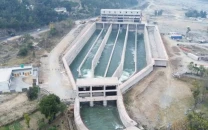Census delay may put next elections in jeopardy: SC
Delimitation of constituencies without a fresh census could be challenged in court, says CJP

PHOTO: FAISAL MOIN/ONLINE
Justice Qazi Faez Essa said the government has always dilly-dallied on its key national and constitutional responsibilities citing sensitivity. “It’s population census, not war. Why do you need the army?” he said. “If the army has to provide security for the census, then where is the writ of the civil government?”
The troubled census
Appearing before the bench, Attorney General for Pakistan Ashtar Ausaf Ali submitted that the census was a sensitive activity which was not possible without the army’s help. The chief justice said there was no need to deploy army troops to provide security for the census in most areas of the country.
Justice Jamali observed that without a fresh headcount the next general elections might have to face postponement. Delimitation of constituencies is important for the elections – and if the constituencies are delimited without a fresh census, then they could be challenged in the court.
Adjourning the hearing till the last week of September, the bench directed the AGP to consult the government and get back to the court with a reply.
The last population census in Pakistan was conducted in 1998, only after a delay of seven years. The fresh headcount has been delayed by successive governments on one pretext or the other.

Separately, another two-judge bench gave a last chance to the federal and provincial governments and the Capital Development Authority to formulate policies for low- cost housing schemes, rehabilitation of slums and construction of social centres for the homeless.
Census put off once again
The bench – headed by Justice Dost Muhammad Khan – observed that if the federal and provincial governments failed to show progress within two months, then the court would initiate contempt proceedings against the relevant officers.
Hearing a constitutional petition of the Pakistan Workers Party (PWP) against the demolition of a slum by the CDA in Islamabad’s Sector I-10 last year, the bench warned that it might even stop salaries of senior officials as well as allotment of plots to the elite.
It also reprimanded the federal and provincial governments for not complying with its earlier orders regarding budgetary allocations as well as legislative measures for low-income housing schemes as well as regularisation of slums. A year has passed, but no visible progress has been made due to the lethargic attitude of the bureaucracy, the bench said. All the governments should be issued show cause notices for their failure to comply with the court’s earlier orders.
Law and Justice Commission’s Secretary Sarwar Khan, who was appointed as focal person in this case, told the bench that despite several reminders, representatives of the federal and provincial governments were not cooperating as they did not attend meetings of the working group on the issue.
Hearing this, the bench asked the federal and provincial secretaries’ of relevant departments to ensure their presence, adding that if they did not attend the meeting then the court would proceed against them.
Census 2016: the way forward
“If the court’s order is not being implemented, then the secretaries of relevant departments should appear in person to cite the reasons,” the bench said while asking Sarwar to submit a progress report on the issue in the chamber.
The copy of the order was also sent to all the federal and provincial chief secretaries and the CDA chairman for compliance of the court’s earlier orders, wherein certain guidelines had been given for formulation of policies on low-cost housing schemes and slums.
The bench also asked the CDA to carry out a comprehensive mapping exercise in the capital with the assistance of the National Database Registration Authority (NADRA) as such exercise would help identify undemarcated open lands and slums that are illegally occupied.
The bench also restrained the CDA from demolishing houses in slums, adding that if anyone constructs a house, then the civic agency will apprise the court through an application and later, the court will pass an appropriate order.
The hearing was adjourned for two months.
Published in The Express Tribune, September 1st, 2016.



















COMMENTS
Comments are moderated and generally will be posted if they are on-topic and not abusive.
For more information, please see our Comments FAQ